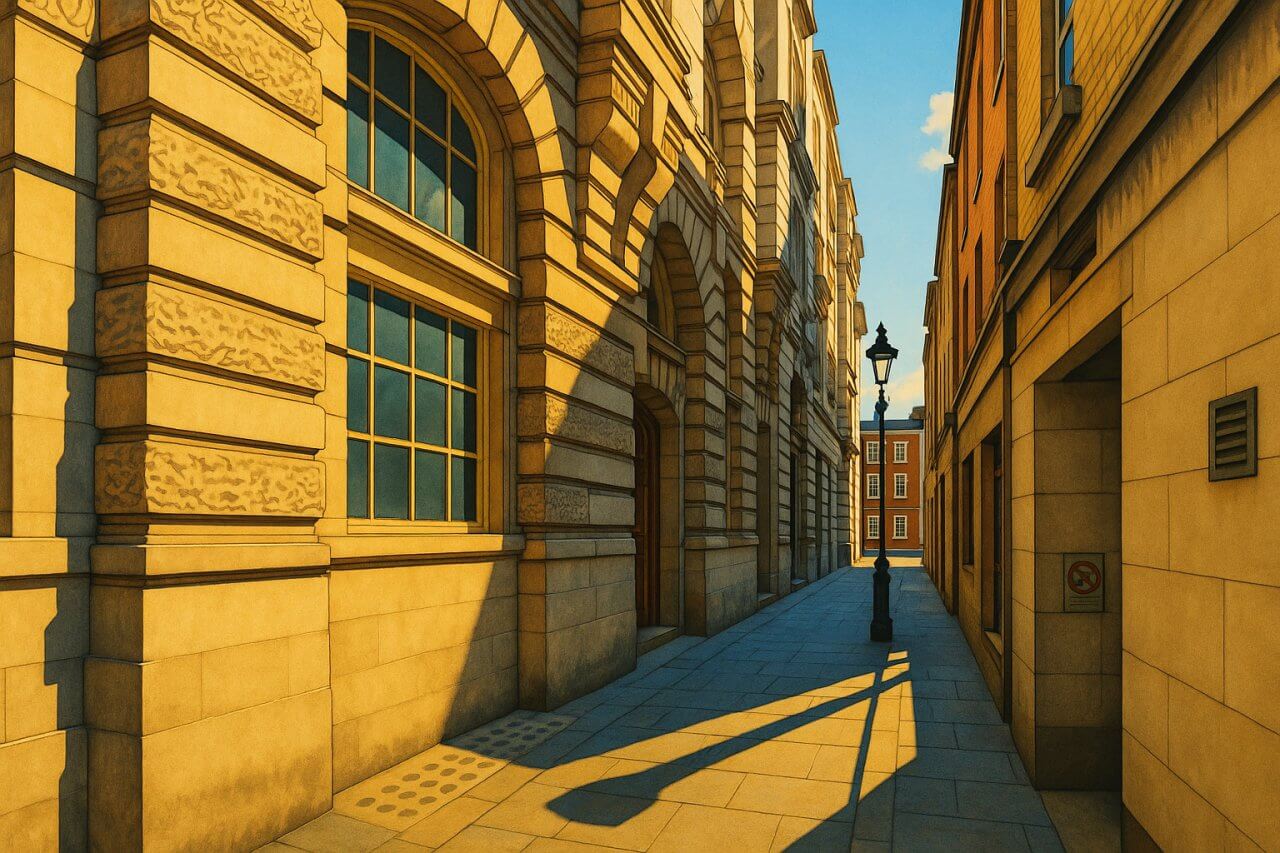
Piccadilly Place, London
Piccadilly Place is a short, narrow alleyway tucked between two prominent London streets—Piccadilly to the south and Vine Street to the north. Despite its diminutive size and quiet nature, it is located in the heart of one of London’s most celebrated districts, surrounded by cultural landmarks, luxury retailers, and historic addresses.
Location and Description
Piccadilly Place lies within the City of Westminster, just a short walk from landmarks such as Piccadilly Circus and Green Park. It functions as a pedestrian passage rather than a vehicular route and is primarily used as a convenient shortcut connecting the grandeur of Piccadilly with the more discreet Vine Street.
The alleyway measures approximately 50 metres (164 feet) in length and runs in a north-south direction. It is not open to vehicular traffic and is primarily surfaced for pedestrian use only. Given its location between two major roads, it serves more as a functional urban passage than a traditional street.
History of Piccadilly Place
There is limited recorded history specifically for Piccadilly Place due to its modest size and utility-focused nature. However, its presence is closely tied to the development of Piccadilly and the surrounding St James’s area in the 17th and 18th centuries, when the West End began to emerge as a fashionable residential district.
The alley likely originated as a service passage or access route during the Georgian and Regency eras, used by tradespeople and staff servicing larger nearby establishments on Piccadilly. These kinds of passages are a common feature in older parts of London.
Name and Pronunciation
Piccadilly Place takes its name directly from the much larger and more famous Piccadilly, one of London’s principal streets. The word "Piccadilly" is believed to derive from "piccadill," a type of stiff collar fashionable in the early 17th century, sold by a tailor named Robert Baker who lived in the area. The pronunciation is:
- Common English Spelling: Pick-a-dilly
- International Phonetic Alphabet (IPA): /ˌpɪkəˈdɪli/

The suffix “Place” in this context typically refers to a small street or passage and is common across London’s older neighbourhoods.
Character of the Street
Piccadilly Place is characterised by its narrow, enclosed feel. Flanked by the rear façades of buildings on either side, it lacks the polished elegance of Piccadilly itself. However, this understated setting gives it a certain hidden charm, particularly for those exploring the finer details of central London’s urban fabric.
Because it is not lined with shops or cafes and has no vehicle access, Piccadilly Place often goes unnoticed by tourists. Nevertheless, it contributes to the hidden layers of the West End and represents a remnant of historical London still serving its original functional role.
Nearby Sights and Attractions
While Piccadilly Place itself has no prominent attractions, it is just steps away from numerous points of interest:
- Piccadilly Circus: The world-famous traffic junction and public space, known for its neon signs and statue of Eros.
- Royal Academy of Arts: Located on Piccadilly, this esteemed institution hosts major art exhibitions year-round.
- Fortnum & Mason: An iconic department store famous for luxury goods, teas, and hampers.
- St James’s Market and Jermyn Street: Nearby hubs for fine menswear and gourmet dining.
Real Estate Overview
Due to its small size and functional character, Piccadilly Place has very few, if any, dedicated residential or commercial properties with a Piccadilly Place address. However, properties on adjacent Piccadilly and nearby streets command some of the highest prices in central London.
As of early 2025, the average price of residential property in the surrounding area is approximately £2,300–£2,900 per square foot (£24,757–£31,215 per square metre) for premium flats and penthouses.1 Apartments tend to range from 600–1,800 sq ft (56–167 sq m) depending on the building and level of luxury.
Transport Links
Underground Stations
Piccadilly Place is extremely well-connected, with several Underground stations nearby:
- Piccadilly Circus – served by the Piccadilly and Bakerloo lines (approx. 3 minutes' walk).
- Green Park – served by the Jubilee, Victoria, and Piccadilly lines (approx. 7 minutes' walk).
- Charing Cross – served by the Northern and Bakerloo lines (approx. 10 minutes' walk).
Bus Connections
Numerous bus routes pass along Piccadilly and Regent Street, offering easy access to different parts of the city. The nearest bus stops are:
- Piccadilly Circus Station / Trocadero (Stop J)
- Regent Street / Piccadilly Circus (Stop H)
These stops are served by frequent day and night buses, including routes 9, 14, 19, 38, and 139.
Fun Fact
Did you know? Piccadilly Place, though barely known to most visitors, has occasionally appeared on walking tours and urban exploration blogs as an example of a London “cut-through”—a pedestrian-only lane still serving its centuries-old purpose as a link between major thoroughfares.
Quick Facts
- Location: Connects Piccadilly to Vine Street, City of Westminster
- Length: Approx. 50 metres (164 feet)
- Traffic: Pedestrian-only
- History: Dates to 18th century or earlier, likely a service alleyway
- Name origin: From "Piccadilly"; related to 17th-century fashion (piccadill collars)
- Pronunciation: /ˌpɪkəˈdɪli/ ("Pick-a-dilly")
- Nearby sights: Piccadilly Circus, Royal Academy of Arts, Fortnum & Mason
- Nearest stations: Piccadilly Circus, Green Park, Charing Cross
- Bus routes: 9, 14, 19, 38, 139
- Property prices nearby: £2,300–£2,900 per sq ft (2025 estimates)
- Character: Quiet alley with historical charm in central London
References
Map of Piccadilly Place, London

Painting of Piccadilly Place, London (View image in full size)